|
|
|
Sort Order |
|
|
|
Items / Page
|
|
|
|
|
|
|
| Srl | Item |
| 1 |
ID:
110292
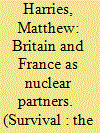

|
|
|
|
|
| Publication |
2012.
|
| Summary/Abstract |
In November 2010, as part of a broad-ranging bilateral defence agreement, the United Kingdom and France signed a treaty providing for limited cooperation on nuclear weapons. Modest in scope, and the product in immediate terms of economic pressure, the nuclear treaty's main substantive provision is for the joint construction of radiographic-hydrodynamic facilities. Beneath the surface of this treaty, however, lies a story of significant strategic shifts, and there are intriguing possibilities for future collaboration between the UK and France, and perhaps for trilateral cooperation involving the United States.
The potential for UK-French collaboration spans the spectrum of nuclear-weapons issues, from technology to policy, and perhaps to operational matters. These possibilities are sensitive, not only because they run into the everyday difficulties of political-military relations between the countries, but also for their relevance to two current debates: the ongoing battle over renewing the UK's fleet of strategic nuclear submarines, and international demands for multilateral nuclear disarmament.
|
|
|
|
|
|
|
|
|
|
|
|
|
|
|
|
| 2 |
ID:
097785
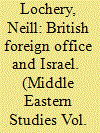

|
|
|
|
|
| Publication |
2010.
|
| Summary/Abstract |
The article examines the complex relationship between the British Foreign Office and Israel. It argues that in 1976 was a year of transformation in the relationship as the Foreign Office shifted towards a more critical approach towards Israel following the resignation of the British Prime Minister Harold Wilson. It makes use of newly available documentary sources from the National Archives in London, which illustrate how the Foreign Office used the resignation of the widely perceived pro-Israel Wilson, and the arrival in power of James Callaghan, to quietly shift British policy towards the Arab-Israeli conflict to fall more into line with the policies of Britain's European Partners.
|
|
|
|
|
|
|
|
|
|
|
|
|
|
|
|
| 3 |
ID:
164660
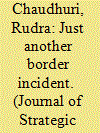

|
|
|
|
|
| Summary/Abstract |
The India–Pakistan War of September 1965 has attracted little attention in the larger body of work on South Asia. Further, almost nothing has been written on the earlier skirmish, in April 1965, between Indian and Pakistani security forces in the Rann-of-Kutch, an uninhabited salt marsh. This article argues that the limited conflict in the Rann, its immediate consequences, and its impact on Pakistani military and civilian leaders were central to Pakistan’s consideration of a military solution to the ongoing dispute in Kashmir, which then led to Indian retaliation and the outbreak of war.
|
|
|
|
|
|
|
|
|
|
|
|
|
|
|
|
| 4 |
ID:
105227


|
|
|
|
|
| Publication |
2011.
|
| Summary/Abstract |
This article focuses upon the British defence cuts undertaken during the final governments of Harold Wilson, 1974-1976, within the broader context of the Anglo-American "special relationship." Utilising previously classified material, it shows how the United States attempted to negate the severity of Britain's defence cuts. Such efforts were largely futile in preventing such reductions. Moreover, Anglo-American co-operation in a number of highly sensitive areas remained largely unaffected. Rather, the consequence for Anglo-American relations was for Britain to lose political standing in the opinion of the Nixon-Ford administrations. In the short term, this process was to have little discernable impact. Rather the repercussions of this became clear once Wilson had left office, most notably during the International Monetary Fund Crisis of 1976.
|
|
|
|
|
|
|
|
|
|
|
|
|
|
|
|
| 5 |
ID:
124187
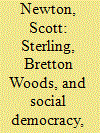

|
|
|
|
|
| Publication |
2013.
|
| Summary/Abstract |
Following the November 1967 sterling devaluation, the British Labour government of Harold Wilson struggled to defend the new exchange rate of £1?=?$2.40. Sterling's travails continued throughout 1968 and well into 1969 despite growing evidence that the external balance was moving into the black. Its problems arose from external difficulties, notably from the growth of footloose balances of foreign currencies-especially Eurodollars-within the international economy and from instability caused by the decline of the Bretton Woods system. Labour was determined to protect the new exchange rate, since a new devaluation or even a float would have led to a run on the pound, the collapse of its economic strategy, and the failure of its attempt to build a social-democratic order in Britain. It was successful in the end thanks to growing confidence in its policies and to belated international co-operation designed to salvage the Bretton Wood regime.
|
|
|
|
|
|
|
|
|
|
|
|
|
|
|
|
| 6 |
ID:
100669
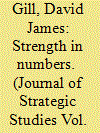

|
|
|
|
|
| Publication |
2010.
|
| Summary/Abstract |
Previous historical accounts have simplified the Labour government's decision to commission a four-boat strategic nuclear deterrent, or 'Polaris force', in early 1965. Utilising previously classified sources, this article shows that a number of key strategic concerns led the decision-making process. Nevertheless, broader economic and diplomatic considerations were also important in determining the size of the Polaris force. A tremendous balance of payments deficit and ongoing debates regarding levels of conventional and nuclear involvement in NATO certainly influenced the government's final decision. Moreover, competing strategic and economic interests resulted in continued debate throughout the decision-making process.
|
|
|
|
|
|
|
|
|
|
|
|
|
|
|
|
|
|
|
|
|